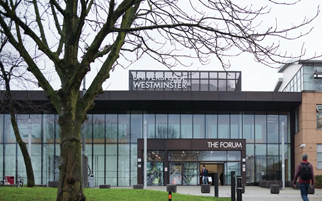University of Westminster

Stimulating debate and raising the profile of digital technologies across the university
Previously when promoting the need to embrace a digital agenda people listened but having something like a nationally recognised framework to discuss and a diagnostic that could help individuals and institutions has added credibility to the debate.
Professor Gunter Saunders PFHEA, associate director digital engagement and library services, University of Westminster
Project aims: enhancing and improving the student experience
The discovery tool is stimulating debate at the University of Westminster – at a senior level and amongst staff and students. Taking part in the 2018 pilot of the tool has helped to secure investment for a £1million, two-year project to advance digital capability, transform the way people work and improve the student experience.
The discovery tool is based on the digital capabilities framework, developed by Jisc over several years with extensive research and discussion with the UK higher and further education sectors.
The university also participated in the 2018 pilot of the digital experience insights surveys for both students and staff to better understand their digital experiences. Data from both services will inform the digital strategy.
Implementation approach
The university has a good digital infrastructure and there is potential to exploit this further. Members of the executive board were invited to acknowledge the importance of digital capabilities to the university, to use the discovery tool themselves and to encourage others to do so – to act as champions. At the same time, the discovery tool was promoted on the virtual learning environment, through committee and departmental meetings. Drop-in sessions were scheduled where staff could discuss the initiative and receive support in logging on and completing the tool. 300 members of staff took part in the pilot – representing approximately 25% of the target audience.
Outcomes and impact
The building digital capability service includes a nationally recognised framework, the discovery tool, an institutional audit tool and checklist – these add credibility and are helping the university to mature and develop its digital strategy.
Staff have endorsed the tool, acknowledging its utility, value and potential benefits. They have found the personalised reports useful and the signposted resources interesting. Time, however, has been cited as a barrier and some have asked who they could talk to about development options indicating a need for more personalised, one-to-one support.
The digital capability team at Westminster comprises five new staff who are closely integrated with the core learning innovation and digital engagement staff. Their role is to provide additional support to staff who complete the discovery tool self-assessment and want some 1:1 support to shape their personal development plan in relation to digital skills.
The cumulative data from use of the discovery tool, alongside that collected through Jisc’s digital experience insights surveys, is being exploited to develop ‘whole department’ approaches to digital development. This is allowing the provision of workshops for groups of staff that are tailored as far as possible to the needs and context of the group concerned.
The team has also put in place an online programme of digital development courses for students, aligned to the national digital capability framework and linked to the award of Westminster Digital Capability Badges. By May 2019 some 7000 students had registered for the online programme and 150 badges had been awarded.
Tips for others and lessons learned
- Senior management sponsorship from the vice chancellor, director of professional services and the wider senior executive group has been instrumental in securing support and funding. Their active engagement in communicating the importance of digital capabilities to committees, departmental groups and their teams is having a positive impact. This is something the team intends to build on going forward
- Direct email proved to be the most successful engagement strategy in encouraging people to initially use the discovery tool. The drop-in sessions were not well attended during the pilot phase. However, there is now much more significant engagement through face to face meetings with cognate groups of staff, following meetings with departmental senior management teams
- Using the cumulative data collected from the digital experience insights surveys, alongside the discovery tool, presents a powerful story to help convince staff to engage
- Developing and promoting a parallel programme for digital development for students also helps to convince staff of the significance of digital development
- Using Student Associates as part of any digital engagement/support team can really invigorate the argument for digital change both within the support team and more widely across the academic and professional services communities
- Don’t be put off by circumstances such as re-organisation which staff may find difficult – for some it offered something different, something new and exciting, a way of moving forward
Next steps
The agreement to fund a two-year project specifically to support digital capabilities development is a significant achievement that is generating momentum. Specific activities planned for the current year include:
- The recruitment and development of a network of champions across the university. This is a critical element of the initiative and the intention is to recruit staff champions plus student associates in each academic school. This will help in developing more one-to-one support options
- The digital capability team will provide customised workshops for departments and schools as well as tailored individual support linked to completion by individuals of the discovery tool
- A programme to support digital development of senior managers will be put in place and delivered
- The institutional audit tool and checklist are being used to get input from and engage stakeholders across the university. This will inform the digital strategy and the funded project
- A communications and internal marketing campaign is being developed
- The discovery tool will also be promoted to students and will be accompanied by a new online programme of digital capability support and training